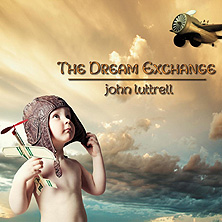 When
it’s done right, the borders between New Age, classical, rock
and jazz music is a nearly invisible line. That’s the case on
The Dream Exchange from multi-instrumentalist John
Luttrell. Recorded at OtterSong Studios in Orange Country, California,
the The Dream Exchange is being described as a composite of
atmospheric New Age ambient and instrumental with intrinsic prog-rock
elements. In a way, John Luttrell’s mix of soaring guitars and
keyboards echoes the one man band spirit of Mike Oldfield or even
Paul McCartney, albeit instrumental McCartney. Many rock guitarists
have a meditative side like this. The side that allows the more experimental,
symphonic side and this is where John Luttrell brings us to in his
music. The CD closer “With You” is alone worth the cost
of hearing this multi-instrumentalist composer in full flight. Speaking
about The Dream Exchange in the following interview, John tells
mwe3.com, "Like most music projects, The Dream Exchange started
out with an idea and a song. The original idea was to create a collaborative,
ensemble album—a
way for different musicians to come together and exchange dreams.
I also feel there’s a meditative dream state that happens when
composing and performing music, as well as, when listening to music.
So, I feel like I am exchanging that dream state through my music
and that’s the other facet of the concept." What’s
even more interesting is that The Dream Exchange is actually
Luttrell’s fifth solo album. With music this good it's worth
going back to see where Luttrell’s unique musical sound evolved
from. With The Dream Exchange, John Luttrell brings the art
of ambient instrumental symphonic rock music to higher ground. www.AtmosphericMusic.com
When
it’s done right, the borders between New Age, classical, rock
and jazz music is a nearly invisible line. That’s the case on
The Dream Exchange from multi-instrumentalist John
Luttrell. Recorded at OtterSong Studios in Orange Country, California,
the The Dream Exchange is being described as a composite of
atmospheric New Age ambient and instrumental with intrinsic prog-rock
elements. In a way, John Luttrell’s mix of soaring guitars and
keyboards echoes the one man band spirit of Mike Oldfield or even
Paul McCartney, albeit instrumental McCartney. Many rock guitarists
have a meditative side like this. The side that allows the more experimental,
symphonic side and this is where John Luttrell brings us to in his
music. The CD closer “With You” is alone worth the cost
of hearing this multi-instrumentalist composer in full flight. Speaking
about The Dream Exchange in the following interview, John tells
mwe3.com, "Like most music projects, The Dream Exchange started
out with an idea and a song. The original idea was to create a collaborative,
ensemble album—a
way for different musicians to come together and exchange dreams.
I also feel there’s a meditative dream state that happens when
composing and performing music, as well as, when listening to music.
So, I feel like I am exchanging that dream state through my music
and that’s the other facet of the concept." What’s
even more interesting is that The Dream Exchange is actually
Luttrell’s fifth solo album. With music this good it's worth
going back to see where Luttrell’s unique musical sound evolved
from. With The Dream Exchange, John Luttrell brings the art
of ambient instrumental symphonic rock music to higher ground. www.AtmosphericMusic.com
mwe3.com presents an
interview with
JOHN LUTTRELL
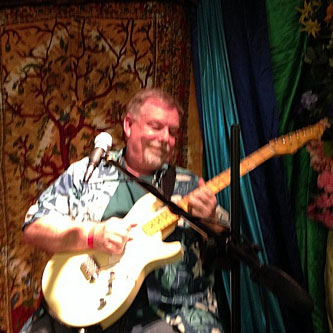 mwe3:
What did you set out to accomplish musically with The Dream Exchange
and where did your music take you, so to speak, conceptually this
time? Is there a concept in play?
mwe3:
What did you set out to accomplish musically with The Dream Exchange
and where did your music take you, so to speak, conceptually this
time? Is there a concept in play?
John Luttrell: Yes, there is a concept, which is kind of multifaceted
and that evolved over time as the album came together. Like most music
projects, The Dream Exchange started out with an idea and a
song. The original idea was to create a collaborative, ensemble album
– a way for different musicians to come together and exchange
dreams.
I also feel there’s a meditative dream state that happens when
composing and performing music AND when listening to music. So, I
feel like I am exchanging that dream state through my music and that’s
the other facet of the concept.
It took about 7 years for the project to come and ultimately I produced
it as a solo album. And, the concept and meaning behind the music
morphed into something that was more global and deeper for me.
The concept is that we all have personal dreams and aspirations in
our lives and if we’re lucky we get to help other with their
dreams, while working on our own dreams. It’s a simple concept
that I think we can all relate to…
What a wonderful thing it is to participate in The Dream Exchange
with those in your life!
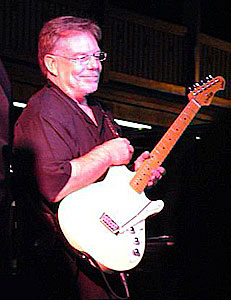 mwe3:
When did you first start releasing music on CD and from a compositional
and technical side, how would you compare your earlier albums with
The Dream Exchange and can you say something about your earlier
recordings? Are the CDs still available and are you planning any retrospectives?
mwe3:
When did you first start releasing music on CD and from a compositional
and technical side, how would you compare your earlier albums with
The Dream Exchange and can you say something about your earlier
recordings? Are the CDs still available and are you planning any retrospectives?
John Luttrell: My first CD release was Underwater Flying
Lessons. It was New Age/Ambient piano with some instrumentation.
It started as just a series of demos on the piano. The intention was
to develop each theme into larger arrangements, but a friend heard
a few of the tracks and convinced me to release them as solo piano,
so I did. The only track that was a full arrangement was called ‘Bank
Shot’. Some of the themes also found their way into the next
two releases, A Sense of Impending Levitation and The Corridors
of Time. These were both Ambient releases, with a blend of acoustic,
electric, and electronic instruments.
All these releases are available on my website, through CD Baby, iTunes,
and Amazon.
As far as retrospectives, there’s a lot of variety on these albums
and I’ve had requests to create some themed collections that
focus on a particular style or instrument: ambient electronic, piano,
and guitar.
mwe3: You’ve lived all over the world. How did you land
in L.A.? Where do you live now? Even though you were born in Venezuela,
you’ve spent most of your life in the US. Do you still like to
travel?
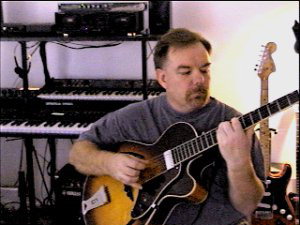 John
Luttrell: Yes, I’ve definitely lived all over the place!
I was born in Venezuela. My folks met there when my dad started working
in the petroleum industry. Over the years, my dad’s job took
the family from Venezuela to the US East Coast, New York and Connecticut,
to Libya, and then in the early 70s to Nigeria. At 14, I went off
to boarding school in Switzerland since there were no American high
schools in Nigeria. During my senior year, my family moved to the
UK where I joined them and I finished high school there.
John
Luttrell: Yes, I’ve definitely lived all over the place!
I was born in Venezuela. My folks met there when my dad started working
in the petroleum industry. Over the years, my dad’s job took
the family from Venezuela to the US East Coast, New York and Connecticut,
to Libya, and then in the early 70s to Nigeria. At 14, I went off
to boarding school in Switzerland since there were no American high
schools in Nigeria. During my senior year, my family moved to the
UK where I joined them and I finished high school there.
I attended college in Phoenix, Arizona, studying electronics engineering.
I’ve always been a tinkerer. It was 1975 and I was a huge progressive
rock and electronic music fan then, so my interest in electronics
was both synthesizer technology and music itself.
How did I land in LA? Well, during high school I played music with
my roommate and future bandmate, Dave Veirs. Dave’s family had
a home in California, but for his dad’s job, they lived in Saudi
Arabia, so he was at boarding school, too. We thought forming a band
would be cool. Rock stars and all, right? So, in 1979, after graduating
from college I moved to LA and formed a prog rock band called ‘Helios’
with Dave.
So, a long road from Venezuela to LA… I still live in the LA
area. Yes, I do like to travel, too.
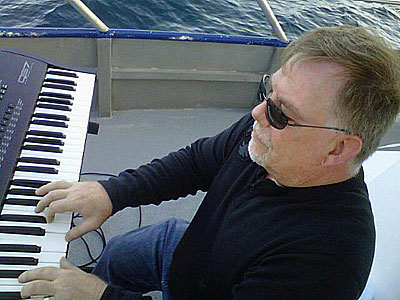 mwe3:
How about guitars? You have a number of guitars. Is the Strat your
favorite? What is the breakdown between acoustic and electric work
on The Dream Exchange? It looks like you have more guitars
than keyboards.
mwe3:
How about guitars? You have a number of guitars. Is the Strat your
favorite? What is the breakdown between acoustic and electric work
on The Dream Exchange? It looks like you have more guitars
than keyboards.
John Luttrell: I definitely have a few guitars. I’ve been
a Strat player for many years and it’s one of my favorites. One
of my early influences was Jimi Hendrix, so trying to get that Hendrix
tone has been a longtime effort (and I’m still trying!) My current
Strat also has a pickup that allows me to control a Roland guitar
synth, so there’s a world of possibilities there. I use a Line6
Variax for many guitar sounds: electric, acoustic, 12 string, dobro,
banjo, and sitar. I have some other guitars and stringed instruments,
including a Gibson SJ acoustic, which has a great tone, and some funky
instruments from South America, Africa, and the Middle East. A pretty
broad palette of sounds, but I mostly use the two electric guitars
and Gibson acoustic for recording.
As far as keyboards, I have an Alesis QS7, which I use for almost
everything. I don’t have an acoustic piano in my small studio,
so I use the QS7 for piano sounds. I have an Arturia controller that
I use for rack mount and software synths. I also have some vintage
analog synths, including a Sequential Circuits SixTrak, which is great
for real analog leads and bass sounds, and a really wonky keyboard
made by Moog called the MG-1, which was sold by Radio Shack. Definitely
some unique sounds on that one!
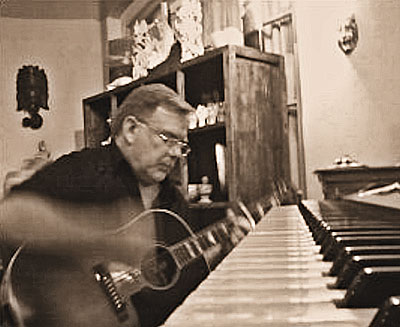 mwe3:
Your music spans so many different genres yet it has its own style.
Would you describe your sound as New Age, jazz or electronic or all
three? You don’t seem like you like categories!
mwe3:
Your music spans so many different genres yet it has its own style.
Would you describe your sound as New Age, jazz or electronic or all
three? You don’t seem like you like categories!
John Luttrell: Yeah, it’s all over the place, isn’t
it? Well, I think growing up in the 60s and 70s popular music evolved
so much. As a kid in the 60s, I listened to The Beatles and the whole
British invasion thing, so that was a huge influence. I think, like
so many guitarists, I was struck by the raw power and virtuosity of
Hendrix, and then so many of the guitar heroes of the day. On the
piano and keyboard, in the 70s, I was into progressive rock like ELP,
Yes, Genesis, Pink Floyd, King Crimson, and The Moody Blues. Then
electronic artists like Tomita, Kitaro, Vangelis, Jean Michel Jarre,
Kraftwerk, and Mike Oldfield which led me to appreciate music that
transcended and progressed the “pop music” genre.
So, you’re right. My music has elements of New Age, jazz, and
electronic, as well as rock, folk, and classical. And, it really depends
on the song. As a whole, New Age is a very diverse genre of music.
Ambient and Progressive Rock are pretty wide categories, too.
I don’t really like to think in terms of categories, but I’m
fine with being thought of as New Age or Ambient. Who knows. I guess
as long as folks find something that resonates with them, that’s
great.
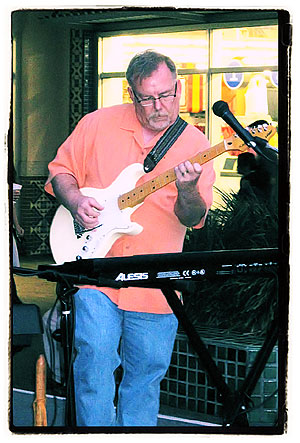 mwe3:
You were a big Moody Blues fan and Mike Oldfield too. Would you say
those are one of your two big influences? I can hear a lot of Mike
Pinder’s sound in your orchestrations and harmonies. Are you
using a mellotron on any of your recordings on the new CD?
mwe3:
You were a big Moody Blues fan and Mike Oldfield too. Would you say
those are one of your two big influences? I can hear a lot of Mike
Pinder’s sound in your orchestrations and harmonies. Are you
using a mellotron on any of your recordings on the new CD?
John Luttrell: Yes, I love both The Moody Blues and Mike Oldfield.
Definitely really big influences. Mike Pinder was a real pioneer of
the Mellotron. The Mellotron was also a big element for other prog
groups like Yes, Genesis, and King Crimson.
So, the Mellotron kind of naturally fit with the music in my head
and heart. I never owned an actual Mellotron. From all the stories
you read, they were really temperamental and super heavy. I use a
digital version of the classic Mellotron string sound on one of my
keyboards.
Mike Oldfield was a wonder to me when I first heard Tubular Bells,
which is still in my top 10 albums of all time, right up there with
Days Of Future Passed by the Moodies.
mwe3: When did you write the music for The Dream Exchange
and can you tell us something about your music compositional style?
Sounds like you’re more into melodies than complex chordings.
John Luttrell: So, I started writing the core themes around
2008, with first track ‘Orange Sky’ as the score for a documentary
in 2010 called Search for the Key by producer and radio host
DJ Thornton.
From there, I brought in themes that I’d been working on and
a couple of acoustic guitar songs from decades ago.
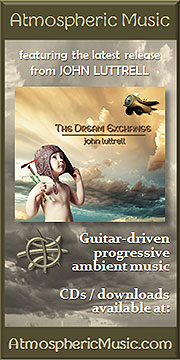 I’d
say my compositional style is pretty iterative, chaotic, and improvisational.
Kind of a standard for the creative process, right? When I’m
in the studio I try to have the “record button” ON most
of the time. When something sounds interesting, I’ll go back
and find the essence of what was resonating with me and then expand
on that. A lot of times, the original improv performance is what I
use in the final mix. That first take is sometimes the best and captures
the inspiration that gets lost when you practice something over and
over and over.
I’d
say my compositional style is pretty iterative, chaotic, and improvisational.
Kind of a standard for the creative process, right? When I’m
in the studio I try to have the “record button” ON most
of the time. When something sounds interesting, I’ll go back
and find the essence of what was resonating with me and then expand
on that. A lot of times, the original improv performance is what I
use in the final mix. That first take is sometimes the best and captures
the inspiration that gets lost when you practice something over and
over and over.
We know that practice makes perfect, but perfection isn’t always
what I’m after. I’m looking for something mysterious or
hidden in the music that evokes a new emotion, distant memory, or
lost chord.
mwe3: When did you start playing and studying music and who
were some of your big guitar influences, rock and instrumental music?
John Luttrell: I started playing music when I was 11 years
old, with a couple of months of piano lessons that didn’t really
stick. I preferred to learn songs by ear, so I stopped taking lessons,
but kept playing piano. I also had a mandolin that was more of a souvenir
and wasn’t really a good instrument, but it worked well enough
that I could pick out a few tunes. It was about the same time I discovered
Hendrix, Santana, and then Jimmy Page… and tried my darnedest
to play some of that on mandolin.
I got my first guitar about a year later, so that’s when I started
playing guitar - it was around 1970.
From there, I was influenced by all those 70s British progressive
rock groups and artists.
mwe3: Do you devote yourself to music full time or do you work
in other fields too and have other interests as well? How do you balance
work and play so to speak?
 John
Luttrell: I work in other fields besides music. When I’m
not producing music, I do multimedia production for online training
and communication programs in a bunch of industries. This includes
creating graphics, animation, and video, and doing voice-over narration.
John
Luttrell: I work in other fields besides music. When I’m
not producing music, I do multimedia production for online training
and communication programs in a bunch of industries. This includes
creating graphics, animation, and video, and doing voice-over narration.
There’s a lot of crossover in the skills for producing music
and other types of electronic media, so I guess “they play well
together”.
mwe3: What is the plan to further expose the great music on
The Dream Exchange and how hard will it be to top that album
with your next musical moves?
John Luttrell: Well, I’ve been working on putting a tour
together, so that is on the radar for 2016. There are some alternate
mixes from The Dream Exchange coming out later this year, so watch
for those.
We talked earlier about retrospectives, so that is a possibility in
the next year. I’m also working on the next album release. No
real details on when that will be out, but it could be in the next
year or so.
Thanks for opportunity to share in the dream exchange!
Thanks
to John Luttrell @ www.AtmosphericMusic.com



